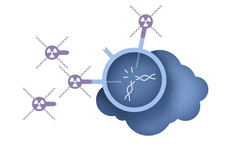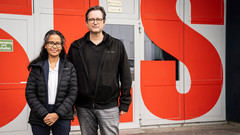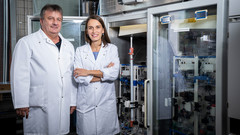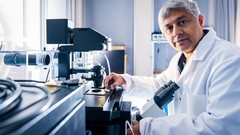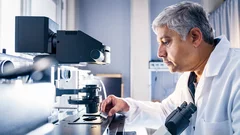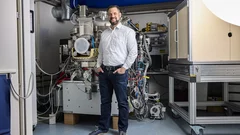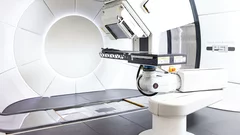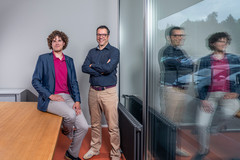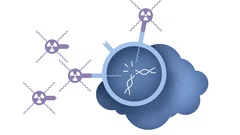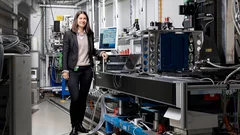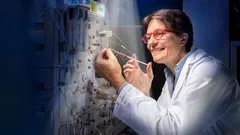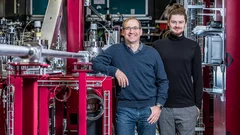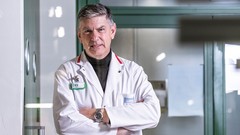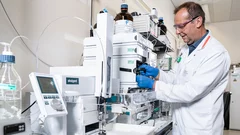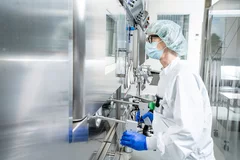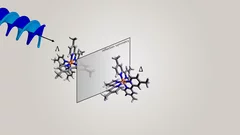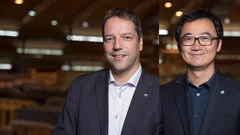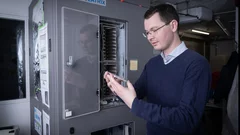Health Innovation
In the area of Health Innovation, several research groups at PSI are engaged in the study of fundamental questions regarding biology and cancer therapy. For example, they explore the structure of proteins – extremely complex biomolecules that are responsible for many different functions in organisms. Using PSI’s large research facilities, scientists also explore processes in biological tissue in order to fully understand their function and the development of specific diseases or deterioration processes. The ultimate goal is to find medicines that allow people to live as healthy a life as possible.
Patients with specific types of cancer are treated at the proton therapy facility on the PSI campus. Radiopharmaceuticals provide cancer treatments for very small tumours distributed throughout the body.
Find out more at: Overview Health Innovation
New nuclear medicine therapy successfully tested
A promising radiopharmaceutical against metastatic neuroendocrine tumours – developed at the Paul Scherrer Institute PSI – has been successfully tested.
Cause of clogged hypodermic needles discovered
Researchers at PSI and the ANAXAM technology transfer center have found the cause of clogging in prefilled syringes.
New possibilities for a healing toxin
PSI researchers discover a surprising mechanism that could broaden the spectrum of therapeutic uses of botulinum toxin.
Enabling early detection of cancer
PSI researchers develop a fundamentally new method for early detection of cancer.
Reprogramming tissue mechanically
Scientists at PSI have used mechanical stimuli to turn connective tissue cells into stem-cell-like cells and transplanted these into damaged skin tissue. This speeds up the regeneration of the skin and the healing of wounds.
Deciphering the secrets of the brain
A place for cutting-edge research: PSI researchers to receive comprehensive funding from the US NIH for their brain research.
A Swiss premiere Proton radiotherapy to treat oesophageal cancer
On 15 August 2023 a patient suffering from oesophageal cancer was treated with proton beam therapy at PSI – for the very first time in Switzerland.
Earlier detection of breast cancer
3D X-rays can improve breast cancer screening.
Fighting tumours down to the last cancer cell
A project that promises to improve the chances of survival for prostate cancer patients has received 2 million Swiss francs in funding.
X-ray imaging after heart transplantations
Synchrotron light can be used in follow-up after a heart transplant to determine whether the body may be rejecting the new organ.
How vision begins
PSI scientists have discovered the very first step occurring in the eye when light hits the retina.
Using light to switch drugs on and off
PSI researchers record a molecular film of a cancer drug fitted with a photoswitch. This opens new insights for drug developers.
Radionuclides for personalised medicine
TATTOOS is part of the upgrade project IMPACT. Roger Schibli explains its importance for the future of cancer treatment.
Paul Scherrer Institute and Apollo Health Ventures Launch Focal Biosciences
Newly established Focal Biosciences will focus on bringing together leading experts and scientific discoveries to harness cellular reprogramming in the fight against common age-related diseases.
Making tumour diagnosis kinder to kidneys
Improved method thanks to a molecular trick
Swissmedic grants operating licence for new radiopharmaceutical production facility
From research to production – the new pharmaceutical lab at PSI supplies neighbouring hospitals with novel cancer drugs.
Making it easier to differentiate mirror-image molecules
Researchers have shown that mirror-image substances – so-called enantiomers – can be better distinguished using helical X-ray light.
European map of aerosol pollution can help improve human health
Researchers have measured and determined the sources of aerosol pollution at 22 locations in Europe.
Nominated: High-precision X-rays of breast tissue
Employing high-resolution X-rays to diagnose breast cancer – PSI researchers nominated for the European Inventor Award.
How to find anti-cancer agents
PSI researchers have developed a new substance that disables a vital protein in the cell skeleton.
